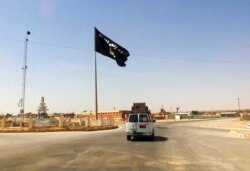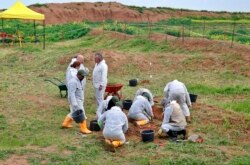Yazidi groups and activists are welcoming France and Sweden's recent decision to organize a joint investigation team to assist in the prosecution of former Islamic State soldiers who perpetrated crimes against members of the persecuted religious minority in Syria and Iraq.
The two European countries formed a joint investigation team last week to look into crimes against humanity and war crimes committed against Yazidis by foreign militants linked to IS during the group's ruthless rule over parts of Iraq and Syria.
French and Swedish investigation efforts are being coordinated by the European Union Agency for Criminal Justice Cooperation (Eurojust). The group said the joint team seeks to organize those efforts and enable information and evidence to be shared more effectively.
"The main aim of the JIT [Joint Investigation Team] will be to identify FTFs [foreign terrorist fighters] who were involved in core international crimes, such as genocide, crimes against humanity and war crimes, primarily perpetrated against members of the Yazidi minority during the armed conflict in Syria and Iraq," Eurojust said in a statement.\
Jabir Jendo, a Yazidi volunteer who has helped Yazidi women and children who were rescued from IS in Syria, said the effort shows there is still time to get justice for Islamic State's victims.
"Moves like this give the Yazidis hope that those who committed crimes against us cannot escape the judicial system and will be held accountable for their horrendous actions," he told VOA, adding that France and Sweden's initiative "should be an incentive for other countries in Europe and elsewhere to put their efforts together in pursuit of justice for the Yazidi community."
Jendo said the "the presence of some of these individuals in Europe is a direct threat to many Yazidi survivors who live there now and continue to suffer from the trauma that these very individuals have probably inflicted on them."
Pursuit of justice
Yazidis are a Kurdish-speaking religious minority viewed as infidels by IS extremists.
In August 2014, IS carried out a massive attack on Sinjar, once home to the largest Yazidi community in the world. At least 5,000 Yazidis, mostly men and boys, were killed during the attack on the northern Iraqi city.
IS then kidnapped thousands of Yazidi children and women, who subsequently were used as sex slaves and child soldiers.
Some of those kidnapped were rescued following the territorial defeat of IS in March 2019, but rights groups say nearly 3,000 Yazidi women and children remain missing to date.
In May 2021 a U.N. investigations team said "there is clear and convincing evidence that the crimes" perpetrated by IS "against the Yazidi people clearly constituted genocide."
According to Ali Isso, director of the Ezdina Foundation, a group that advocates Yazidi rights, the formation of a joint team by Eurojust Agency "is a real step forward in pursuit of the terrorists who participated in the genocide campaign against the Yazidis."
"It can now be said that the terrorists, some of whom fled to the European Union, no longer have a place of refuge after the formation of this team," he told VOA, "Because one of its main powers is to obtain a bank of information on the suspects, and thus there will be effective cooperation between this team and the intelligence authorities of EU members."
Isso urged other countries to follow suit "in order to tighten the screws on the remnants of the terrorist organization" in Europe, the Middle East and elsewhere.
Eurojust said authorities in several EU countries already have brought charges for terrorism and core international crimes related to IS, also known as ISIS. In a German court, for example, an Iraqi man was sentenced to life in prison in November for his involvement in crimes against the Yazidis.
The United States has repatriated more than two dozen Americans who supported Islamic State and brought criminal charges against some of them. However, the Biden administration has not publicly indicated whether it supports a broad investigation into Islamic State atrocities. Last year, the United States and 17 other countries issued a joint statement expressing their willingness to help Yazidis displaced by Islamic State and advocate for their rights.
Six years late
Some experts said while the establishment of this joint investigation team is an important development in the search for justice for Yazidi victims, it is six years late.
"The ISIS atrocities and genocide were well known and documented already by 2015 when many mass graves were found in and around Sinjar," said Seth Frantzman, the author of the book "After ISIS," who has written extensively about the Yazidis.
"That it has taken six years to do basic work means that the forensic evidence is gone, memories may fade, the thousands of missing Yazidis will likely not be found, and the ISIS criminals have long since begun to fade back into the societies they came from," he told VOA.
Frantzman said, however, that "if this task force and coordination can produce several symbolic trials it will be worth it. It is important to create an archive of survivors' testimonies and commemorate the victims of ISIS and show that there is no impunity for the perpetrators."
This story originated in VOA's Kurdish Service.



